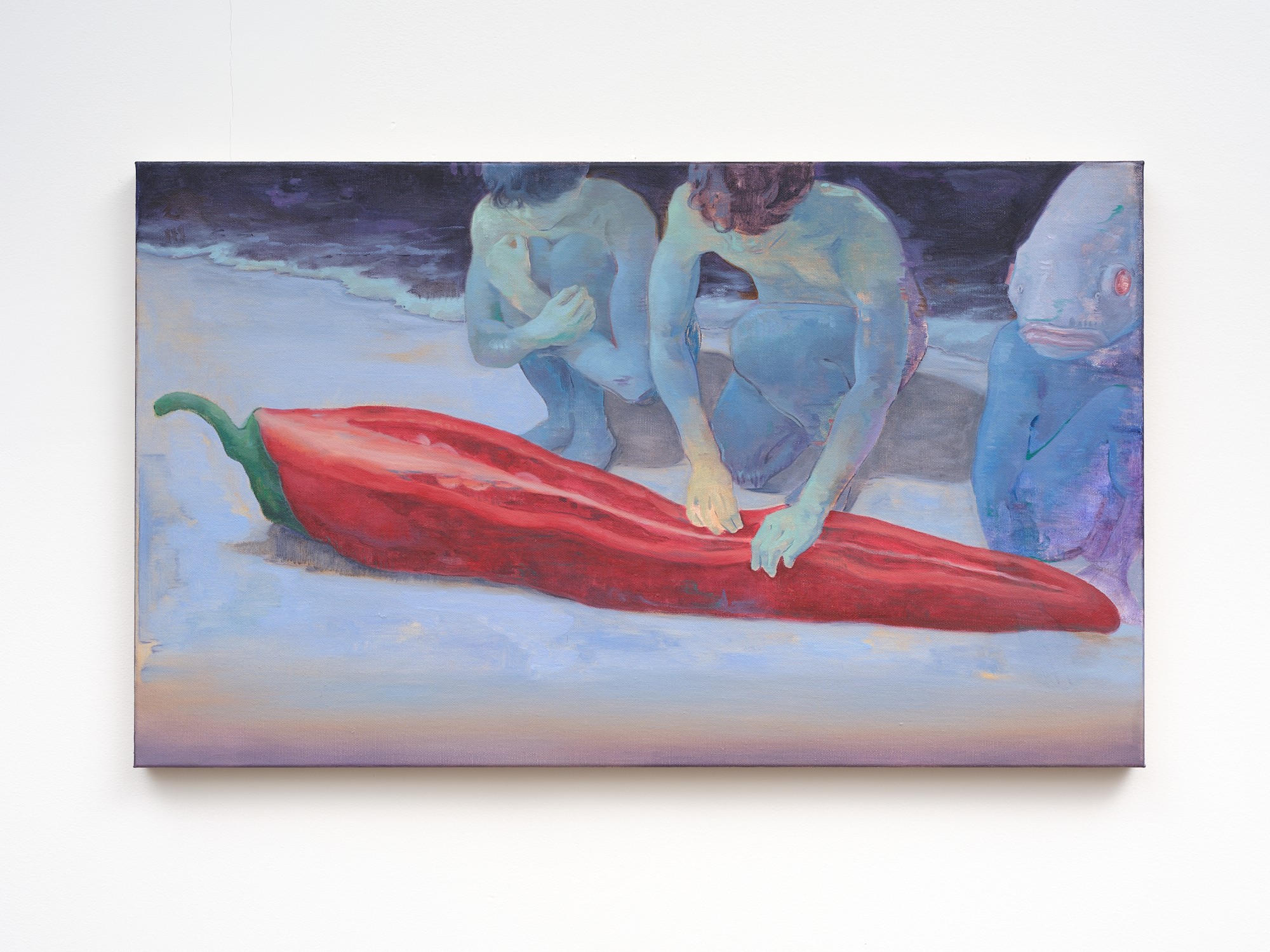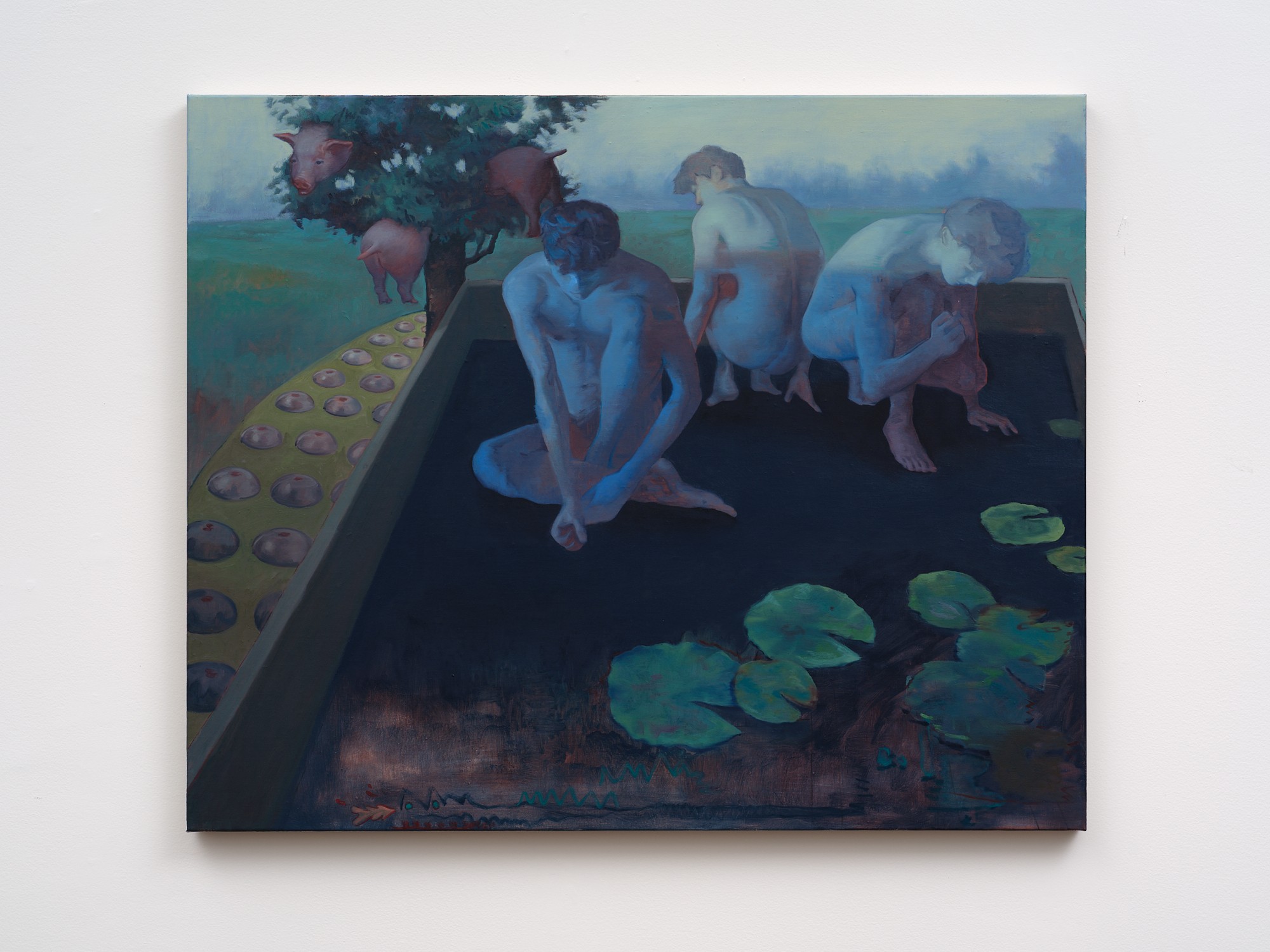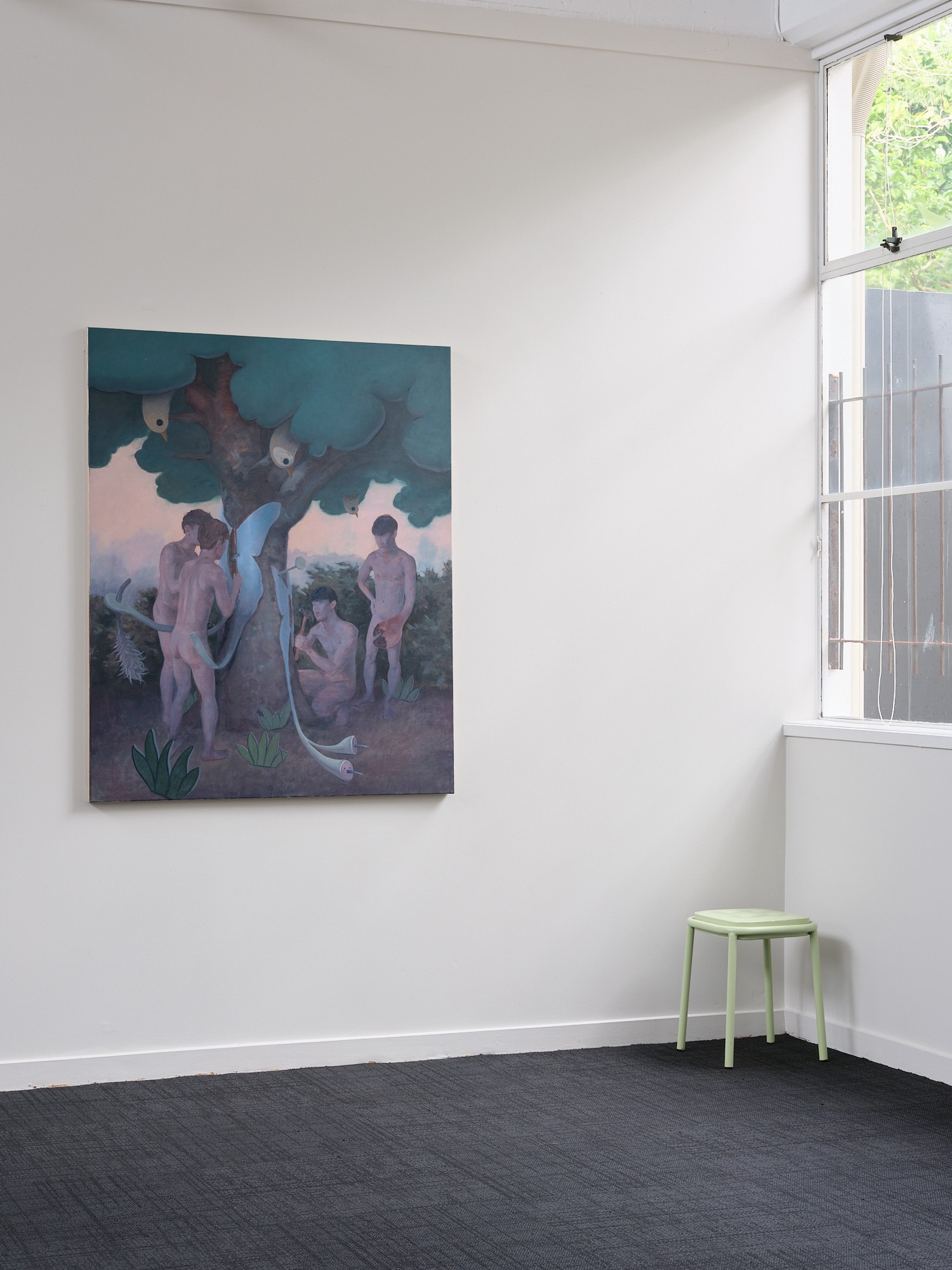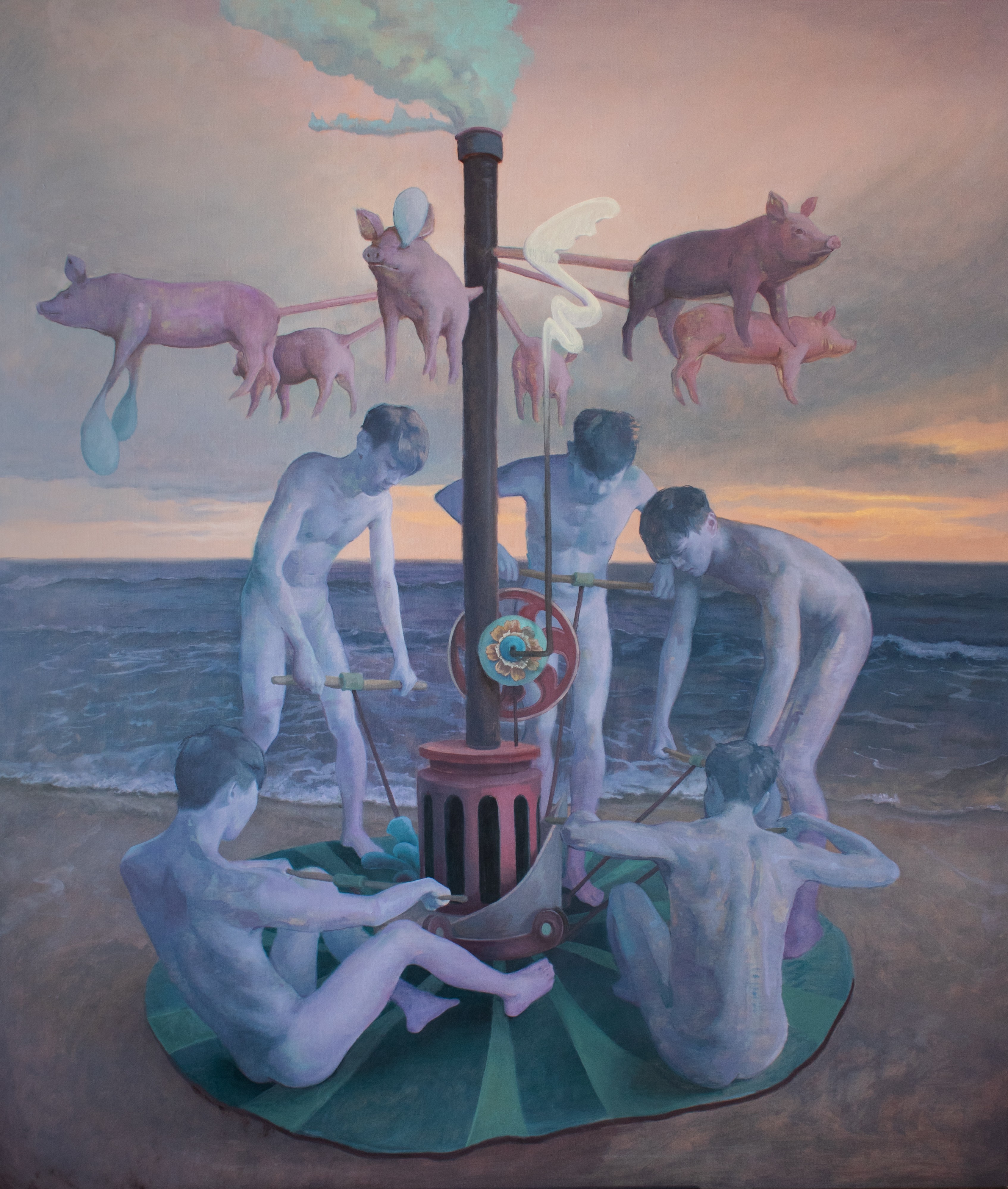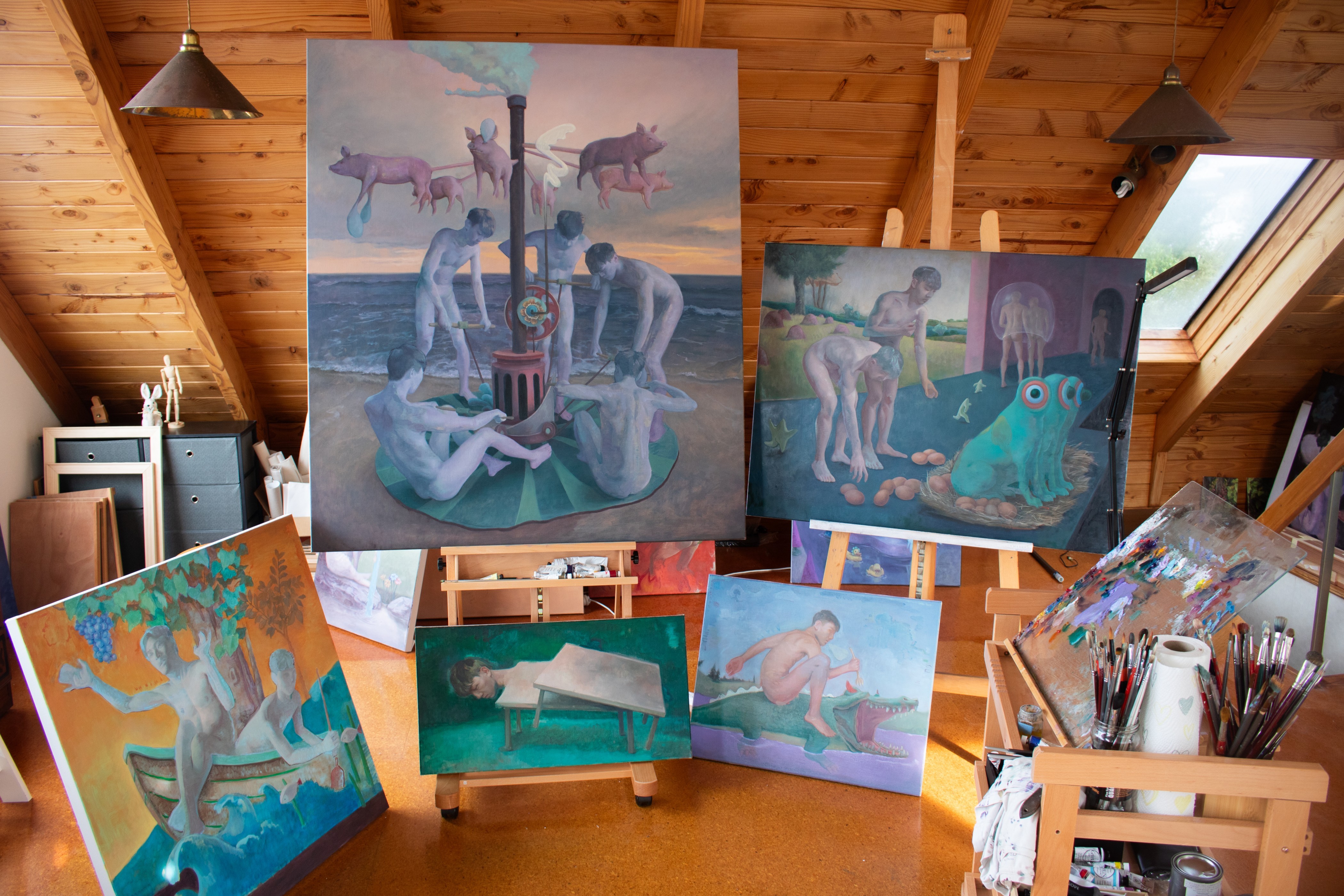INFO
| Name | Tony Guo (he/him) |
| Born | 1999 |
| Country of Birth | Aotearoa |
| Place of Residence | Tāmaki Makaurau Auckland |
| Ethnicities | Chinese |
| Artform | Visual arts |
| Decades Active | 2020s |
ABOUT
Tony Guo is a painter based in Tāmaki Makaurau who creates large-scale compositions that explore the surreal and absurd. He produces imagery of animals, nude male figures, and complex scenery, all interacting with one another in nonsensical ways. In his surreal oil-painted realms, pigs grow from washing lines and naked boys sit next to a half-man half-fish observing a large split red chilli. As noted by Jo Bragg for The Art Paper:
Guo’s allegories have no specified meaning. No beginning, middle or end. In their absurdity the works offer a playfully dark personal history alongside a vast reimagined world, full of limitless potential beyond apprehension, for both the artist and the audience alike.
Guo was born in Tāmaki Makaurau, but grew up in Northeast China. His family made the decision to move back to China soon after Guo was born, partly so their children could learn Mandarin. At the age of 12, Guo moved by himself back to Tāmaki Makaurau after his sister had also relocated here, to continue his education in Aotearoa. Encouraged by his art teacher, Joon-Hee Park, at Westlake Boys High School, Guo enrolled to study visual arts at Auckland University of Technology (AUT). He stayed with several host families until he was 18, at which time he could move out on his own. In 2022 he gained his Master of Visual Arts with Honours and he continues to tutor part-time at AUT.
Describing his own work, Guo states:
I like to find a middle space conceptually that is quite hard to define. A lot of the reception that I get from people is that they feel really confused about what to feel. [The work] is funny, but upon second glance it may seem uncomfortable. It’s erotic, but it’s also quite safe. There is no definite way to make sense of my paintings and I like to encapsulate that unfathomable aspect of human experience. I like to think about oppositions, like black and white, not opposite to each other, but next to each other.
The figures Guo creates are often mixed with blue-purple tones as if their bodies are cold and rigid, creating a sombre atmosphere. He uses broad strokes and a deeper contrast between colours to create background features. He then moves into more intricately blended hues and more precise shapes as the subjects come to the forefront — skillfully merging a variety of fleshy tones. The level of detail he constructs in his paintings purposefully fluctuates to show the characteristics of the oil paint he uses and to create a varied visual plane that is more akin to a dreamscape than our reality.
In 2023, Guo’s exhibition Sand was displayed in the foyer space of Jhana Millers Gallery in Pōneke. He created these paintings after visiting his late grandparents’ graves in China earlier that year. He was struck by the degree to which revolution, war and migration had deeply affected the previous generations of his family and, in turn, himself. In these paintings, he paints nude characters that resemble himself, where he or his body serves a particular purpose in the obscure environments he has placed himself in. In response to this series, Jennifer Cheuk wrote:
The landscapes in Sand move between desolate and full, presenting the Sisyphean absurdity of the working class allegory. Acts of survival quickly become a voyeuristic spectacle, rendered into comedic occult: Figures work diligently to pump a pig-machine, or to pick eggs from a mammalesque creature.
Familial themes continue into Swan Crash at Season Aotearoa (2025), where Guo ruminates on the laborious jobs his family undertook during the social upheavals that took place in China during the 20th century. In this series he contemplates how these familial experiences in China have informed his life experiences in Aotearoa. Guo states that he is dealing with hierarchies of power in this show. The paintings depict figures that play particular roles in these systems, like people who are carrying out labour-heavy jobs, animals that are part of industrial machinery, and objects that survey these environments. While he considers these histories in his work, Guo articulates that:
I don’t see myself as a narrative painter who tells specific stories. I don’t want people to obsess over meaning in [the work], but I want them to see texture, tactility, layers and gesture of the paint as a luring point into the realm that I have built in the painting.
LINKS
Key works / presentations
2025 — Swan Crash, Season Aotearoa, Tāmaki Makaurau
2024 — Duck, duck, loose, MEANWHILE, Pōneke
2023 — Sand, Jhana Millers Gallery, Pōneke
2023 — Dogtooth, Paper Anniversary, Tāmaki Makaurau
2023 — Summer, Melanie Roger Gallery
2023 — Auckland Art Fair
2023 — The Dinner Party, RM Gallery and Project Space, Tāmaki Makaurau
2022 — Beyond Borders, Beresford Square, Tāmaki Makaurau
2020 — Layers: Filling the Void, Pah Homestead, Tāmaki Makaurau
2020 — Emergent: See, Lake House Arts Centre, Tāmaki Makaurau
2019 — Accept Each Word Spoken with Love, Northart Gallery, Tāmaki Makaurau
Key awards
2023 — NZ Painting and Printmaking Award: Major Prize
2023 — Molly Morpeth Canaday: Merit Award
2023 — Cleveland National Art Award: Youth Prize
